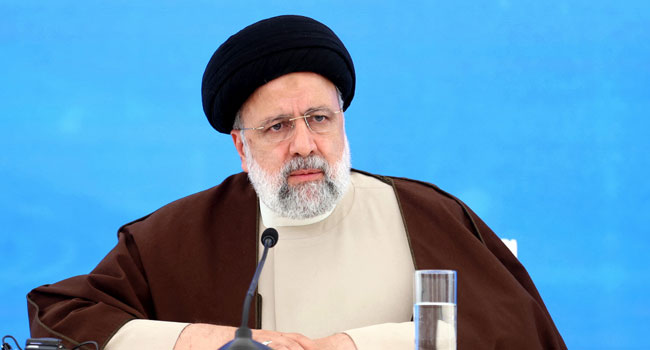Iran’s Deputy President for Executive Affairs, Mohsen Mansouri, reported that two members of President Ebrahim Raisi’s team have made contact with rescue teams, indicating that the helicopter incident was not severe, according to IRNA news agency.
Mansouri stated that on Sunday, President Raisi’s helicopter, along with two additional helicopters, were traveling to the city of Tabriz following the inauguration of Qiz Qalasi Dam at the Iran-Azerbaijan border.
Thirty minutes into the flight, contact was lost with President Raisi’s helicopter, leading to a search operation, Mansouri explained. The fact that two members of the president’s team reached out to rescue teams suggests the incident was not grave.
He also noted that the Ministry of Communications has pinpointed the accident’s location within a two-kilometer radius.
In response to the helicopter crash news, the Supreme Leader of Iran’s Islamic Revolution, Ayatollah Seyyed Ali Khamenei, offered prayers for President Raisi’s safe return during a meeting with the families of Islamic Revolution Guards Corps staff and commanders.
Ayatollah Khamenei, while expressing sorrow over the troubling incident involving the president and his entourage, voiced hope that God would safely return the president and his colleagues to the nation.
He assured the Iranian people that they should remain calm and confident that the incident would not affect the country’s daily operations.
“The Iranian nation should not worry. The country’s operations will not be disrupted,” Ayatollah Khamenei stated.
IRNA news agency reported that over 40 rescue teams with search dogs and drones were dispatched to the location.
President Raisi was in the province to inaugurate a dam project with Azerbaijan’s President Ilham Aliyev, at the border of the two nations.
The convoy carrying Raisi consisted of three helicopters, two of which, as reported by Tasnim news agency, “safely reached their destination.”
The search efforts are being closely monitored by foreign nations amid heightened regional tensions due to the Gaza war between Israel and Hamas since October 7, which has involved other armed groups in the Middle East.
“We are closely monitoring reports of a potential hard landing of a helicopter in Iran that was carrying the Iranian president and foreign minister,” stated a US State Department spokesperson.
“We have no further comment at this time.”
An Iranian Red Crescent team was seen walking up a slope in thick fog and drizzling rain, while other live footage showed worshippers reciting prayers in the holy city of Mashhad, Raisi’s hometown.
In neighbouring Iraq, Prime Minister Mohamed Shia al-Sudani “instructed the interior ministry and the Iraqi Red Crescent and other relevant authorities to offer available resources… to aid in the search”.
Azeri President Aliyev said in a post on X that “we were profoundly troubled by the news of a helicopter carrying the top delegation crash-landing in Iran”.
“Our prayers to Allah Almighty are with President Ebrahim Raisi and the accompanying delegation,” he said, noting that his country “stands ready to offer any assistance needed”.
The accident happened in the mountainous protected forest area of Dizmar near the town of Varzaghan, said the official IRNA news agency.
Military personnel along with the Revolutionary Guards and police had also deployed teams to the area, said army chief-of-staff Mohammad Bagheri.
Iran’s Health Minister Bahram Eynollahi said medical resources had been dispatched.
The reformist Shargh daily also reported that “the helicopter carrying the president crashed” while two other helicopters had landed safely.
Interior Minister Ahmad Vahidi said one of the helicopters “made a hard landing due to bad weather conditions” and that it was “difficult to establish communication” with the aircraft.
Raisi has been president of the Islamic Republic since 2021 when he succeeded the moderate Hassan Rouhani, for a term during which Iran has faced crisis and conflict.
He took the reins of a country in the grip of a deep social crisis and an economy strained by US sanctions against Tehran over its contested nuclear programme.
Iran saw a wave of mass protests triggered by the death in custody of Iranian-Kurdish woman Mahsa Amini in September 2022 after her arrest for allegedly flouting dress rules for women.
In March 2023, regional rivals Iran and Saudi Arabia signed a surprise deal that restored diplomatic relations.
Saudi Arabia on Sunday voiced “great concern” after Sunday incident, offering to help with the response.
“We affirm that the Kingdom stands by the sisterly Islamic Republic of Iran in these difficult circumstances and its readiness to provide any assistance that the Iranian agencies need,” the foreign ministry of the Gulf kingdom, a longtime rival of Iran, said in a statement.
The war in Gaza that broke out on October 7 sent regional tensions soaring again and a series of tit-for-tat escalations led to Tehran launching hundreds of missiles and rockets directly at Israel in April 2024.
In a speech following Sunday’s dam inauguration, Raisi emphasised Iran’s support for Palestinians, a centrepiece of its foreign policy since the 1979 Islamic revolution.
“We believe that Palestine is the first issue of the Muslim world, and we are convinced that the people of Iran and Azerbaijan always support the people of Palestine and Gaza and hate the Zionist regime,” said Raisi.
Raisi, born in 1960 in northeast Iran’s holy city of Mashhad, served as Tehran’s prosecutor-general from 1989 to 1994, deputy chief of the Judicial Authority for a decade from 2004, and then national prosecutor-general in 2014.
His black turban signifies direct descent from the Prophet Mohammed, and state media has referred to him by the senior title of ayatollah in the Shiite clerical hierarchy.










